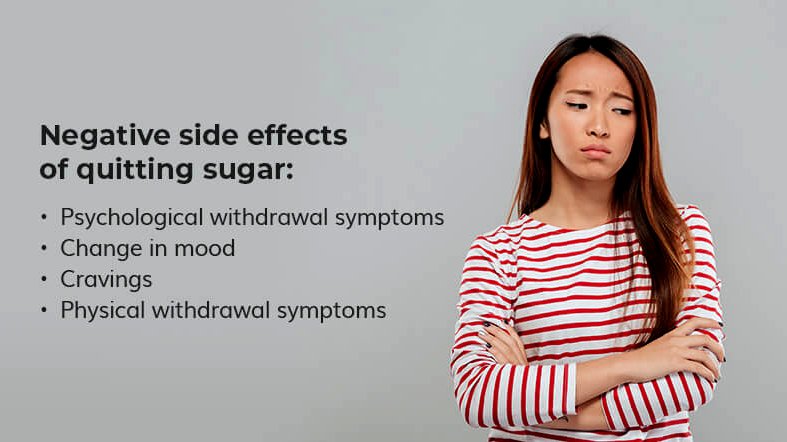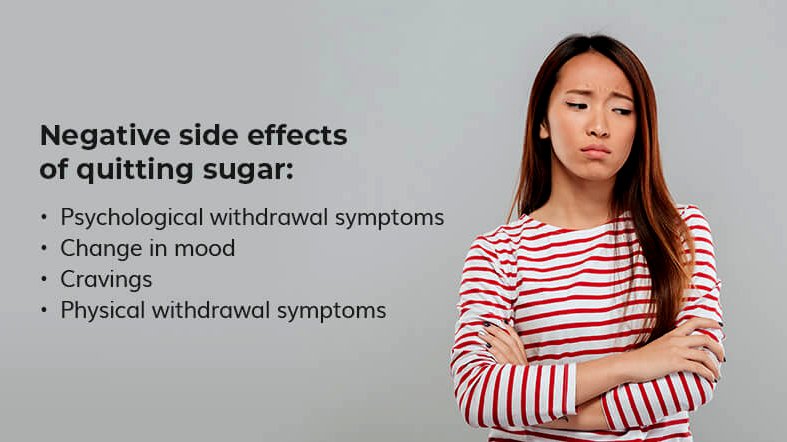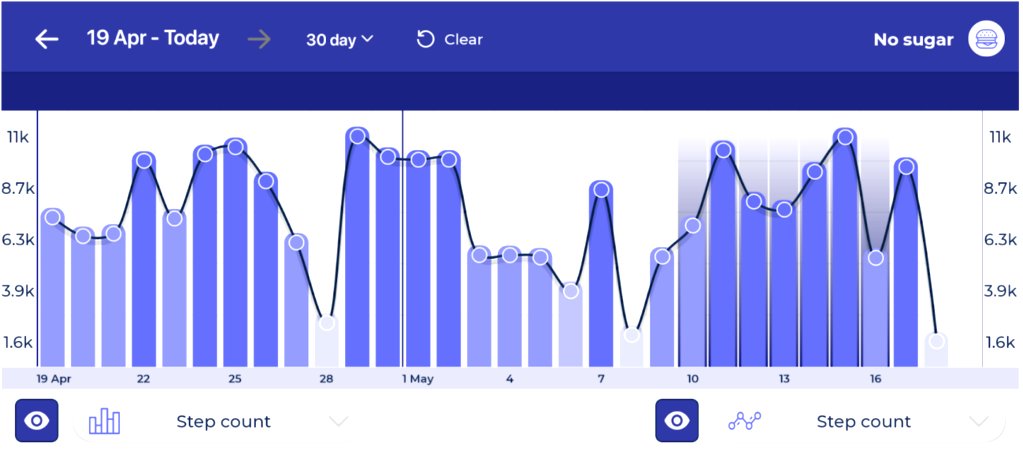Sugar, an all-too-common element in our everyday lives, possesses a harmful side that can impact both our physical and mental wellbeing. Perhaps you've heard talk of no-sugar diets and are curious what will happen if you abstain for 14 days - the answer may be more complicated than expected!
Make no mistake; taking on the no-sugar challenge can be daunting. Sugar is one of the world's most addictive substances, making breaking free from its grip no easy feat. Yet its detrimental effects provide ample motivation for seeking out a sugar-free lifestyle; its positive outcomes ranging from improved energy levels and lower risk of chronic diseases like Type 2 diabetes and heart disease are undeniable advantages of doing without.
Journeying towards sugar independence can be challenging. Anyone attempting to reduce their sugar consumption will likely experience symptoms of sugar withdrawal syndrome - an unpleasant mix of headaches, irritability, cravings and fatigue - when trying to decrease intake. You might wonder why bother taking the time and trouble; are the positive outcomes outweighing its discomfort?
Are you ready to experience what happens when you reduce sugar for 14 days? Look no further than our informative and valuable article; filled with insights and tips that can help you navigate this challenging task successfully. We will discuss symptoms associated with sugar withdrawal, the advantages of adopting a no-sugar diet, as well as its effect on mental health - plus provide strategies for quitting it altogether! Fasten your seatbelts as we explore more about what reducing your intake can do to your mind and body!
I. Sugar Withdrawal Symptoms
Sugar withdrawal syndrome has gained increasing attention recently. Its symptoms, often described as mildly uncomfortable to downright unbearable, and lasting up to two weeks in extreme cases are well documented and unpleasant. They result from your body becoming dependent upon sugar for energy boost and struggling with adapting without it.
Headaches
One of the more frequently reported sugar withdrawal symptoms is headaches. Abstaining abruptly from sugar will result in blood sugar levels dropping suddenly, constricting blood vessels, leading to constriction and severe headaches.
Mood Swings
Alongside headaches, mood swings are another prevalent side effect when cutting back on sugar intake; excessive blood sugar consumption tends to produce inconsistent fluctuations that cause some degree of instability in mood; when sugar consumption ceases, significant mood shifts such as irritability, mood swings and depression may ensue.
Fatigue and Cravings
Another side effect of sugar withdrawal syndrome is fatigue. Sugar provides the body with an instant burst of energy when quickly absorbed into the bloodstream; however, this boost usually wears off quickly before creating feelings of exhaustion and fatigue. Individuals who cut back or stop altogether on sugar may also experience intense cravings for sweet foods and drinks due to an established dependence.
At the end of the day, it is essential to understand and acknowledge the potential symptoms associated with sugar withdrawal syndrome in order to manage them more easily. There are ways of making the experience less uncomfortable as well, including:
- Gradually decreasing sugar intake rather than going cold turkey
- Staying hydrated
- Engaging in physical activity
- Getting sufficient rest
- Mediating
- Eating a well-rounded diet including fruits and vegetables
Remember, managing sugar withdrawal symptoms can be done through a combination of patience, resilience, and a healthy lifestyle. In no time, the unpleasant symptoms associated with sugar withdrawal syndrome will be a thing of the past and a healthier, happier you will emerge.
Learn more on patient.info about sugar withdrawal symptoms.II. Sugar Withdrawal Symptoms
Eliminating sugar for just 14 days may result in significant improvements to both physical and mental wellbeing. Cutting back can significantly lower inflammation levels within your body, which in turn lowers your risk of chronic diseases; you will likely also notice weight loss, greater energy levels, and enhanced mental clarity - among many other improvements!
Sugar and Weight Gain
Sugar consumption has long been linked with weight gain in areas of flabby bulges - like the belly and hips - leading to weight accumulation. If you can cut back or avoid sugar consumption altogether, this may prompt your body to use preexisting fat stores for energy, leading to significant weight loss. Furthermore, inflammation caused by excessive sugar intake has been shown to promote weight gain; by cutting back or completely discontinuing intake you'll reduce inflammatory markers - an integral factor against obesity.
Reducing Chronic Inflammation
Quitting sugar for 14 days may also help limit chronic inflammation, an essential contributor to various health problems including heart disease, cancer, and arthritis. Sugar is known to exacerbate inflammation; by cutting back your sugar consumption, you could lower your risks of these ailments.
Increased Energy Levels
After cleansing your body of sugar, your energy levels will also skyrocket. Sugar provides temporary bursts of energy before eventually subsiding - often leading to crashes - but cutting out sugar results in steady blood sugar levels throughout the day, giving a steady amount of energy that translates into greater productivity, concentration, and cognition.
Reduced Risk of Chronic Ailments
Slacking off sugar may reduce your risk of chronic ailments like Type 2 diabetes, heart disease, and cancer - as previously discussed. Think of it as insurance against future health complications!
Better Mental Health
Mental health can also benefit from a diet with no added sugars. Sugar fluctuations can create sudden mood shifts, increased anxiety levels, and depression; by eliminating sugar, your mood becomes more stable; you experience fewer mood swings during the day, and greater cognitive function and concentration are attained, resulting in reduced irritability, stress levels, and anxiety.
Discover, in just 14 days, many noticeable benefits in body and mind by going sugar-free; this change is bound to lead to healthier and happier living!
III. The Benefits of Going Sugar-Free for 14 Days
Mental health can be an indecipherable topic that often escapes human understanding. Understanding the impact of sugar consumption on mental health requires extensive study. Studies have revealed its negative correlation with depression, anxiety and mood swings which present individuals with unique challenges when trying to live a balanced life.
Sugar's effects on mental health
Sugar's effects on mental health depend on several variables, which further complicate this topic. Eating large quantities of sugar releases insulin and leads to an exacerbation in blood sugar levels followed by a sudden crash, leaving one feeling irritable and experiencing mood swings. But this is only part of the picture; other aspects contribute as well; such as inflammation in the brain caused by too much sugar intake increasing depression and anxiety risks.
>"Though this issue can be complex, there is hope."
No-sugar diet
Studies have demonstrated that adopting a no-sugar diet can result in reduced inflammation and enhanced cognitive functioning, potentially decreasing depression and anxiety risk. This is accomplished by stabilizing blood sugar levels while simultaneously improving mood stability and decreasing inflammation - thus strengthening cognitive performance and decreasing depression risk.
Maintaining optimal mental health
Maintaining optimal mental health can be a difficult challenge, made more so by genetics, stress and lack of sleep. Understanding the effects of sugar on mental health can assist individuals in making informed choices regarding diet to mitigate challenges to mental wellbeing and live more fulfilling lives. With this knowledge comes hope for improved physical and emotional well-being!
Learn more at Healthline.IV. The Impact of Sugar on Mental Health
Sacrificing sugar may seem daunting at first, especially for those accustomed to its sweet taste. Don't despair though; there are ways you can navigate this no-sugar challenge successfully and we have provided some tips below that may help.
Planning ahead
First and foremost, planning meals ahead is an invaluable strategy to avoid being tempted to indulge in sugary treats. Knowing exactly what's on the menu allows you to stay away from such treats.
Reading labels
Reading labels carefully is also of utmost importance when making informed choices. Sugar often disguises itself as fructose, glucose or sucrose in processed food products; to make informed choices and spot hidden sugars it's vital that we read labels carefully and seek them out when selecting food products.
Replacing sugary treats
When sugar cravings strike, try replacing them with healthier options such as fruit, nuts, seeds and vegetables to not only limit your sugar consumption but also provide several health advantages. This practice will not only keep your sugar intake under control but may even bring many unexpected health advantages.
Staying hydrated
Staying hydrated by drinking sufficient water is one of the key steps toward meeting the sugar-free challenge. Water helps you feel satiated, reduce hunger pangs, flush out toxins from your system, and ultimately lessen cravings for sugary treats.
Mindful eating
Mindful eating is also essential when trying to overcome sugar addiction. Savoring your meals slowly and mindfully will help lower stress levels, enjoy them more fully, and recognize when you're full, which reduces chances of overeating.
Celebrating small victories
Celebrate every step taken toward building a sustainable no-sugar habit, no matter how small they may seem. From making it through one day on your diet without succumbing to sugar to making progress towards long-term goals - every success deserves recognition and praise from you and yourself alike! These small victories will add up over time and lead you toward long-term progress.
As you begin this no-sugar journey, remember it won't be easy or enjoyable unless managed effectively and managed with these tips.
Conclusion: Take on the Ultimate 14-Day No-Sugar Challenge Today!
Engaging in a 14-day no-sugar challenge may seem like an impossible feat, yet its benefits are immense. By taking on this difficult endeavor, you're giving your body an opportunity to increase energy levels, combat inflammation, shed excess pounds, reduce risk factors for chronic diseases and discover newfound mental clarity and emotional well-being.
Sugar withdrawal symptoms may present an obstacle in reaching your sugar-free goals, but you can manage them through careful planning and preparation. Gradually decrease your sugar consumption; familiarize yourself with labeling procedures; swap unhealthy options for healthier ones; and take measures to stay hydrated by drinking plenty of water daily.
Mindful eating practices, celebrating small victories and keeping the big picture in mind can be powerful motivators in helping to keep yourself on the journey to giving your body its much-deserved makeover. Quitting sugar for 14 days will begin this important journey for achieving transformation!
Balance is key when it comes to leading a healthier lifestyle, not deprivation. Make the journey memorable while trusting in the process; after two weeks you should see results of your hard work and gain motivation to sustain new healthy habits.
So don't wait a second longer: take on the ultimate no-sugar challenge now and allow your mind and body to enjoy its transformation, opening the path toward becoming healthier, happier versions of yourself!




